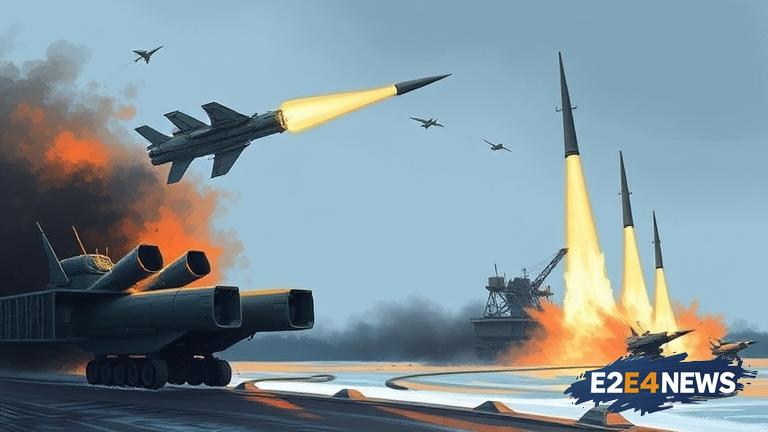In a move that has sent shockwaves throughout the international community, Russia has officially abandoned its self-imposed moratorium on the production and deployment of intermediate-range missiles. This decision has significant implications for global security and has raised concerns about the potential for a new arms race. The moratorium, which was initially put in place in 2019, was a key component of Russia’s efforts to reduce tensions with the West and avoid a costly and potentially destabilizing arms race. However, with the collapse of the Intermediate-Range Nuclear Forces Treaty (INF) in 2019, Russia has seen fit to resume the development and deployment of these missiles. The INF Treaty, which was signed in 1987, prohibited the development and deployment of ground-launched missiles with ranges between 500 and 5,500 kilometers. The treaty was a cornerstone of European security and played a crucial role in reducing the risk of nuclear war. However, the United States withdrew from the treaty in 2019, citing Russian non-compliance, and Russia has since followed suit. The Russian government has stated that the decision to end the moratorium is a response to the actions of the United States and other Western countries, which it claims have been developing and deploying similar missiles in recent years. The move has been met with widespread criticism from Western governments, which have expressed concerns about the potential for a new arms race and the destabilizing effects of these missiles on European security. The United States, in particular, has been vocal in its criticism of Russia’s decision, with officials warning that it could lead to a significant escalation of tensions between the two countries. The European Union has also expressed its concerns, with officials stating that the move undermines the stability and security of the region. China, which has been developing its own intermediate-range missiles in recent years, has welcomed Russia’s decision, seeing it as a potential opportunity to strengthen its own military capabilities. The decision to end the moratorium has also sparked concerns about the potential for an arms race in other regions, including Asia and the Middle East. The development and deployment of intermediate-range missiles could have significant implications for regional security, particularly in areas where tensions are already running high. The move has also raised questions about the future of arms control agreements, with many experts warning that the collapse of the INF Treaty could have far-reaching consequences for global security. In response to Russia’s decision, the United States has announced plans to develop and deploy its own intermediate-range missiles, which could further escalate tensions between the two countries. The situation has sparked a heated debate about the role of arms control agreements in maintaining global security, with many experts arguing that they are essential for preventing the proliferation of nuclear weapons and reducing the risk of conflict. Others, however, have argued that these agreements are no longer effective and that new approaches are needed to address the changing security landscape. As the situation continues to unfold, it remains to be seen how the international community will respond to Russia’s decision and what the long-term implications will be for global security. The move has significant implications for the global balance of power and could have far-reaching consequences for international relations. The development and deployment of intermediate-range missiles could also have significant economic implications, particularly if it leads to a new arms race. The cost of developing and deploying these missiles could be substantial, and it could divert resources away from other important priorities, such as economic development and social welfare. Furthermore, the move could also have significant environmental implications, particularly if it leads to an increase in nuclear testing and the development of new nuclear weapons. The international community must come together to address the challenges posed by Russia’s decision and to find new ways to reduce the risk of conflict and promote global security. This could involve the development of new arms control agreements, as well as efforts to promote dialogue and cooperation between nations. Ultimately, the goal must be to reduce the risk of conflict and to promote a more stable and secure world, where the threat of nuclear war is minimized and the benefits of international cooperation are maximized.





